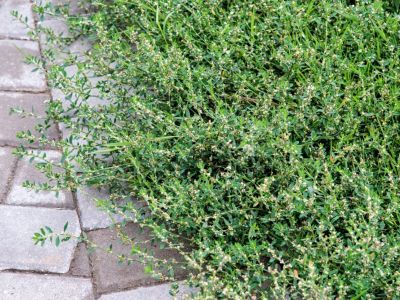Prostrate Pigweed Identification
Prostrate pigweed grows in a circular form with low-growing stems coming from a central spot so it looks like a spider web. The radial stems are reddish purple and can grow more than a foot (31 cm.) long. The leaves on prostrate pigweed are about a half inch (1 cm.) long and oval shaped. The flowers on prostrate pigweed are reddish green and not significant. The flowers will produce seeds that look like small black sand grains. The prostrate pigweed spreads through these seeds.
Prostrate Pigweed Control
As with many weeds, the best way for controlling prostrate pigweed is to keep it from growing in your yard in the first place. This plant grows best in sandy soil and is commonly found in bare, sandy spots like riverbanks and near roads. If you find that you have problems with prostrate pigweed, it’s an indication that you have sandy soil. Improving the sandy soil will help get rid of prostrate pigweed or keep them from growing to begin with. This plant is an annual, but its seeds are very resilient and can live 20 years before they need to germinate. This means that total prostrate pigweed removal can be a long process. You need to remain persistent when controlling prostrate pigweed. The nice thing about prostrate pigweed is that it grows in a shape that makes it very easy to hand pull the plants. Firmly grab the center of the prostrate pigweed plant and pull out the central stem with as much of the root as possible. The entire plant should come away. It is best to keep a sharp eye out for the plant in spring and pull it as soon as possible — before it develops seeds. When you get rid of prostrate pigweed before it goes to seed, you reduce its ability to come back in future years. If you wish to kill prostrate pigweed with chemical controls, look for weed killers that contain the chemicals dicamba, glufosinate-ammonium, or glyphosate. Glufosinate-ammonium or glyphosate are both non-selective weed killers and will kill any plant they come in contact with, so they should only be used in locations where you wish to clear out all weeds and plants. Weed killers that contain dicamba are selective to weeds that include prostrate pigweed and can be used among landscaping plants. Controlling prostrate pigweed is not impossible and being persistent in your efforts to get rid of prostrate pigweed will be rewarded with a prostrate pigweed free yard. Note: Any recommendations pertaining to the use of chemicals are for informational purposes only. Specific brand names or commercial products or services do not imply endorsement. Chemical control should only be used as a last resort, as organic approaches are safer and more environmentally friendly
